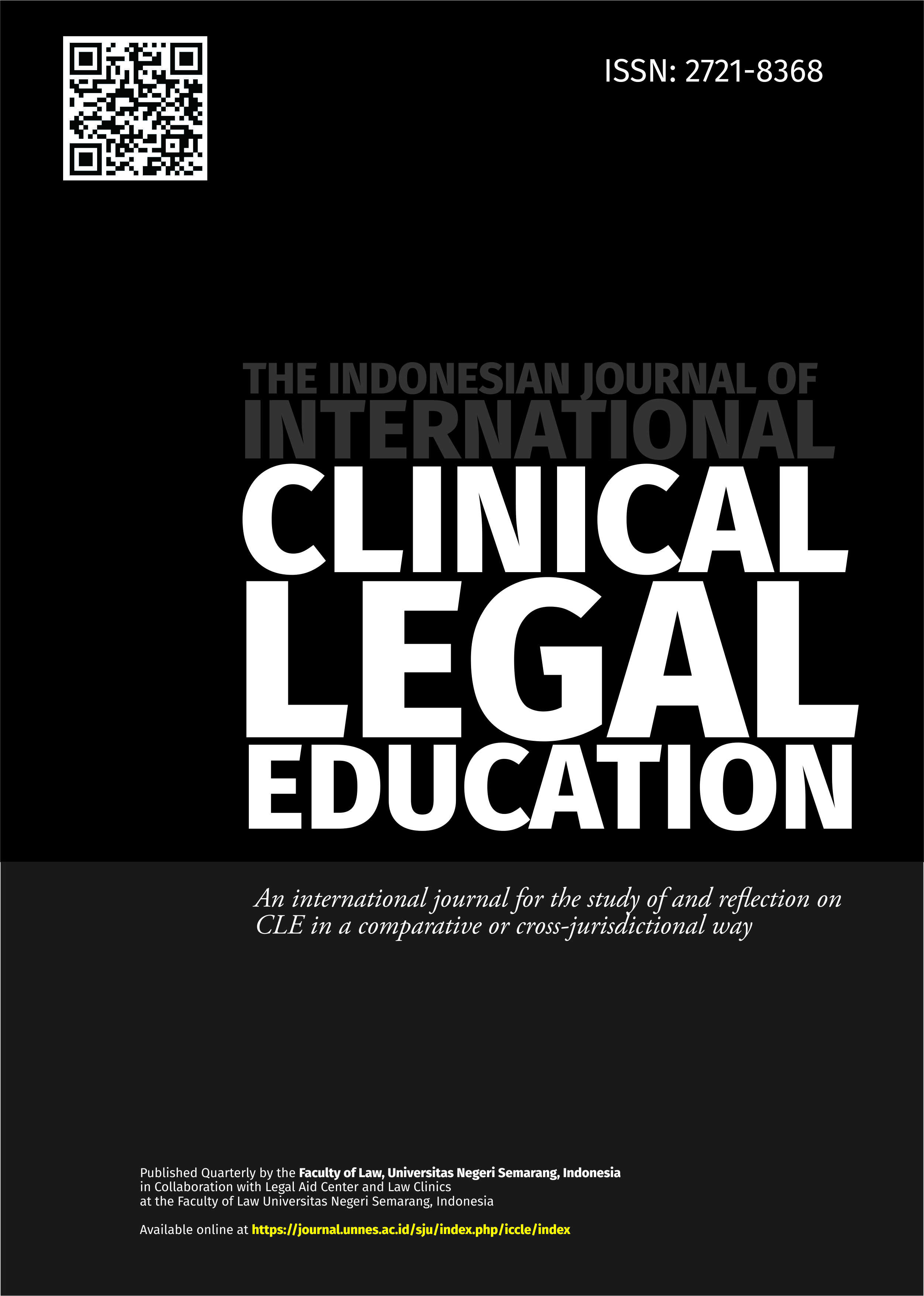The Role of Legal Aid Institutions in Providing Legal Aid for Suspects and Defendants
Main Article Content
Abstract
Indonesia is a state of law, one of which is equality before the law. One of the forms is the existence of legal aid institutions to protect human rights. In this case, it is the suspect/defendant whose rights are often violated due to the arbitrariness of the legal apparatus from arrest to trial. Even though legal rules and codes of ethics have been regulated, every law enforcement officer cannot guarantee that the rights of the community, especially suspects and defendants, are fulfilled. So that this legal aid institution takes the role so that people's rights, both legal protection, legal assistance, good treatment can be accepted by suspects or defendants, so that arbitrariness does not occur. For this reason, legal aid institutions recruit advocates, paralegals, lecturers, and law students to participate in implementing legal aid. Legal aid is given to the poor but does not rule out the possibility of giving it to children, persons with disabilities, women, the elderly, Indonesian workers, or other vulnerable people or groups in accordance with their regional context and regulated in laws and regulations. The suspect himself must be given to the suspect who is threatened with imprisonment of more than 5 years and is incapacitated or is threatened with a sentence of 15 years or death. Otherwise, the claim is considered invalid.
Article Details

This work is licensed under a Creative Commons Attribution-ShareAlike 4.0 International License.
The copyrights of the article in Indonesian J. Int'l Clinical Leg. Educ. is on the Author(s), however, before publishing, it is required to obtain written confirmation from Author(s) in order to ensure the originality (Author Statement of Originality). The statement is to be signed by at least one of the authors who have obtained the assent of the co-author(s) where applicable. This work licensed under a Creative Commons Attribution-ShareAlike 4.0 International (CC BY-SA 4.0). All writings published in this journal are personal views of the authors and do not represent the views of this journal and the author's affiliated institutions.
References
Dermawan, H. (2016). Hak dan Kewajiban Advokat menurut Undang-Undang Nomor 16 Tahun 2011 tentang Bantuan Hukum. Lex et Societatis, 4(2).
Forum Akses Keadilan untuk Semua. (2012). Bantuan Hukum untuk Semua. Jakarta Selatan: Fokus
Harahap, M. Y. (2009). Pembahasan Permasalahan dan Penerapan KUHAP Penyidikan dan Penuntutan. Jakarta: Sinar Grafika.
Kadafi, B., et.al. (2001). Advokat Indonesia Mencari Legitimasi Studi Tentang Tanggung Jawab Profesi Hukum di Indonesia. Jakarta: Pusat Studi Hukum dan Kebijakan Indonesia & Asia Foundation.
Kambey, F. F. (2013). Larangan dan Sanksi Pidana Bagi Pemberi Bantuan Hukum. Lex Crimen, 2(4).
Kompas.com. (2021). “Kemenkumham ingatkan Petugas Tak Lakukan Kekerasan pada Warga Binaan”. kompas.com. 10 Maret 2021 diakses pada tanggal 9 Juli 2021 pukul 03.00 WIB di https://nasional.kompas.com/read/2021/03/10/07413761/kemenkumham-ingatkan-petugas-tak-lakukan-kekerasan-pada-warga-binaan?page=all
Makinara, I. K. (2013). Pengaruh Bantuan Hukum terhadap Masyarakat Miskin (Meninjau Undang-Undang Nomor 16 Tahun 2011 tentang Bantuan Hukum. Jurnal RechtsVinding Media Pembinaan Hukum Nasional, 2(1).
Merdeka.com. (2021). “Kontras sebut Kasus Penembakan Paling Banyak dilakukan Polisi Selama Setahun”. Merdeka.com. 30 Juni 2021, diakses pada 9 Juli 2021 pukul 2.45 WIB di https://www.merdeka.com/peristiwa/kontras-sebut-kasus-penembakan-paling-banyak-dilakukan-polisi-selama-setahun.html
Nasution, A. B. (1988). Bantuan Hukum di Indonesia. Jakarta: LP3ES.
Palilingan, J. (2015). Hak dan Kewajiban Penerima Bantuan Hukum Ditinjau dari Aspek Hak Asasi Manusia. Lex Administratum, 3(7)
Phahlevy, R. R., et.al. (2021). Modul Pelatihan Paralegal. Sidoarjo: UMSIDA Press.
Polii, R. N. (2018). Bantuan Hukum oleh Advokat Dalam Proses Pengajuan Gugatan Perdata dalam Kaitannya dengan Penegakan Hukum Perdata Materil. Lex Privatum, 6(6).
Pristiwanto, B. (2013). Menjadikan Keteladanan Sebagai Roh Pendidikan Karakter di Akpol. Tanggon Kosala, 2(1), 1-14.
Ramdan, A. (2014). Bantuan Hukm Sebagai Kewajiban Negara untuk Memenuhi Hak Konstitusional Fakir Miskin. Jurnal Konstitusi, 11(2).
Sukadana, D. G. T. (2016). Keabsahan Pemberian Bantuan Hukum terhadap Tersangka yang Melakukan Tindak Pidana di Daerah Bali. Kertha Wicara: Jurnal Ilmu Hukum, 5(6).
Triyanto, G. 2018. Persamaan Hak Bagi Tersangka atau Terdakwa untuk Memperoleh Bantuan Hukum Dalam Kitab Undangundang Hukum Acara Pidana (KUHAP). Jurnal Rechtens, 7(2).
Wulandari, C., Wicaksono, S. S., & Khikmah, U. F. (2019). Paralegal Existence in Providing Access to Justice for the Poor in Central Java. IJCLS (Indonesian Journal of Criminal Law Studies), 4(2), 199-206.
Yayasan TIFA Lmbaga Bantuan Hukum Indonesia. (2018). Panduan Penyelenggaraan Bantuan Hukum di Daerah. Jakarta: Menkuham.
